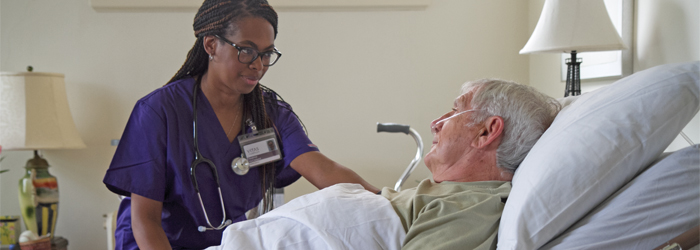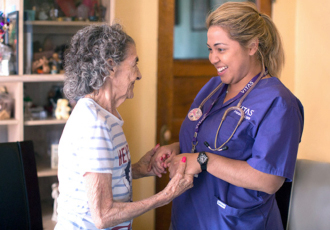Hospice Team Members Remember the Patients They’ll Never Forget

Every VITAS Healthcare employee aims to improve the quality of life of our patients, but our hospice team members have the greatest direct impact on patients’ well-being. However, the relationship between caregiver and recipient is not one-way—many nurses, therapists, social workers and doctors find themselves changed by their experiences with patients.
Below are stories from our hospice team about the patients who helped them grow.
Old Friends, New Family
When I was working in the field as a certified nursing assistant, I took care of a female patient with Alzheimer’s who could be quite aggressive. The patient’s daughters were always there on shower day and would laugh when they heard their mother hitting me with the hand-held sprayer. Despite the initial struggle, once the shower was over, the patient would hug me, kiss me and tell me she loved me.
We all became very close over the years that I cared for this woman. One day, while the patient’s daughters and I were having a conversation about where their mother used to live, we realized that my father and I used to frequent an ice cream store owned by the patient’s parents. The patient I was caring for used to serve me ice cream!
I still talk to my former patient’s daughters, and we see each other on Christmas every year. I thank God for the opportunity I was given to grow with each new experience during that period. In the end, not only did I help those women take care of the most precious person in their lives, but they became my second family.
— Dawn Huber, Financial Records Specialist
Search for an open positionThe Keys to His Passion
Within my first month on the job at VITAS’ Miami office, I heard about a patient who had been an avid musician. He was frail, in his mid-90s and never left his bed at the nursing home.
After coordinating with some of my college contacts and members of the hospice team, we arranged for the man to play the brand-new, hand-crafted pipe organ on the stage in the chapel at Olivet Nazarene University.
The patient was lifted onto the bench with his oxygen tank next to him. After a moment to catch his breath, the typically bed-bound nonagenarian began moving his hands and feet in a way none of us knew was possible. Not only did he play beautifully, but he also played entirely from memory despite not having touched a keyboard in decades.
I will never forget the joy we felt in offering this gift to our patient. Even if just for a day, he was able to leave his tiny room and bed and re-engage with his passion. VITAS gave this man the chance to play the music he loved one last time.
— Andrea Franklin, VITAS Representative
Beautiful Music Together
I was working with a 70-year-old male patient who had gone through severe mental illness and homelessness throughout his life. A couple of months before I met him, he was diagnosed with cancer and hospitalized for a long time before being put on hospice care at a facility.
This patient had been an avid piano player all his life, but he had no access to a piano at this point. I saw an opportunity to bring that joy back into his life.
I lugged my roller bag, guitar and a keyboard into his facility every week. Nothing made him happier than my visits, when he was able to play the piano. We spoke about favorite artists—his was Elton John. We shared beautiful sessions together.
The experience changed me, as I realized that the music was the therapy in this instance. Music is such a powerful force, especially for someone who has been a part of it for his entire life.
— Mia Iliopoulos, Home Care Music Therapist
Difficult Patient? Just Listen.
When I started working for VITAS Healthcare, I was asked to see a patient who had refused their primary RN/case manager and requested a new one. As an RN who has had difficult patients before, I went in to the patient’s home a bit leery. However, I was surprised to find that I was taking on two patients: a husband and wife.
He was the most doting, loving, attentive husband I had ever met, and simply wanted better care for his wife. When I asked how I could provide what he expected, he explained, clearly and with ease, and I strived to meet his expectations.
This experience taught me that every patient and family has unique needs, and that we only need to listen closely to understand them. I valued the chance to witness such a pure, true love, and to be reminded that sometimes we need to slow down and try not only to receive, but to give a love like that.
— Sierra R. Evans, Performance Improvement Specialist
That and a Cup of Coffee Will Win Over a Patient
I saw a male patient in the inpatient hospice unit who had pancreatic cancer. I observed the disease process and informed him that I needed to change his medications to make him more comfortable. He replied, “That’s it? This is going to be our relationship? You will come in for five to 10 minutes and only make medication changes?”
I thought, What else do you want from me?
It was Saturday and I had office hours shortly, so I told him that I would sit and have coffee with him tomorrow. And the following day, I visited him. As I was leaving the room after the visit, he said, “Doc, what about the coffee?” He remembered!
I came back with two cups of coffee, and we sat together and talked some more. I found he was lonely, and just sitting, talking and drinking coffee was more meaningful to him than anything else I was doing for him. I visited him every day while he was in the unit, even when I wasn’t on service. When he went home, I continued to call him to chat. This one patient has changed my way of practicing.
— Muhammed Longi, MD
You Make a Difference, Even When You Don’t Think You Do
I have been running a VITAS grief support group for some time now. One of the widows who attends shared that she had been seriously contemplating suicide, and that if it weren’t for the support group, she would have gone through with it. This was a very emotional meeting with lots of tears and hugs. She continues to attend the group today—and continues to grow!
I started this career to help people, and I have to admit that, at times, I have wondered if I make any difference. This experience taught me that what we do matters more than we may ever realize.
I am truly blessed to be in a career that positively affects others each and every day, and allows for the opening of hearts, even in tragedy.
—Diane Ruhbech, Social Worker
The Heart and Hands of Hospice
One snowy day, I went to my patient’s home. The stairs leading to her door were covered with snow, and when I finally made it up to her door, I knocked and immediately asked for a shovel. The patient initially refused, but I insisted on at least clearing the stairs (of course, I shoveled her porch and walkway, too). When I was done, I went inside and showered my patient. Afterward, she said, “I love you—what would I do without you?”
Hospice has changed my life in so many ways. I have many patients and families tell me they love and appreciate me. Some even say they wish they could clone me!
I don’t feel like what I do is a job—it’s something that has to be done to help those in need. I appreciate all my patients, and I do my best to treat them as I would want to be treated.
—Kimberly Brown, Home Health Aide
How Much Better Could It Have Been?
When I was a home care nurse 32 years ago, I never referred my patients to hospice because I thought I could meet patients’ needs by myself. I had become very close with one particular patient—a young father of five—and his family.
During the six months that I cared for him, I made myself available 24/7.
During his last two weeks of life, I was in his home around the clock when he had uncontrolled symptoms and provided endless hours of psych/social support for this young family. I was emotionally and physically exhausted trying to do this on my own.
Shortly after his death, I ran into a VITAS nurse at the hospital, who commented about how tired I looked. When I explained the case to her, she asked why I hadn’t called hospice in, and explained all of its benefits without making me feel like a failure.
That was the turning point in my career: I learned you can’t do it alone.
How much better would my patient’s quality of life have been if his symptoms were managed properly? How much better could his family have prepared for his death if they had the support of a social worker or chaplain? How much more time could his young wife have spent talking with him if a hospice aide came to assist with his daily care?
How much support did they fail to receive because I thought I could do it all?
—Deb Pape, Admissions RN

Choose a Career with VITAS
We offer a variety of full-time, part-time and per-diem employment opportunities. Employees earn competitive salaries and have the flexibility to choose a benefits package suitable to their own needs and lifestyle.
See Current Opportunities
